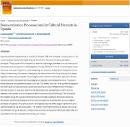Democratisation Processes Amidst Cultural Diversity in Uganda

View/
Date
2022-11Author
Kyazike, Elizabeth
Kanyamurwa, John Mary
Babalanda, Stanley
Metadata
Show full item recordAbstract
Uganda attained independence on the 9th of October 1962 with a diverse cultural spectrum. Yet current analyses hardly interrogate the role of culture in the country’s democratisation processes. The purpose of this chapter is to examine the linkages between cultural diversity and democratisation processes in a heterogeneous society. While this is not a fundamentally unique discourse, the case of Uganda is quite interesting and warrants investigation. Using the cultural theory of democracy, the chapter investigates the various forms of cultural diversity that shape Uganda’s democratic processes, the strategies used to harness democratic aspirations amidst diversity and the implications of the strategies on Uganda’s democratisation drive. To achieve these objectives, an explorative design is utilised. This entails the use of the qualitative approach and techniques for data collection, specifically focusing on documentary review methods. A thematic analysis is utilised to examine the democratisation contradictions within existing debates in the context of culture-based analytics and the cultural framework. The findings of this chapter reveal the cultural diversities that have shaped Uganda’s democratic practices, democratic harnessing strategies and how these aspects have affected the democratisation processes of Uganda. This partly explains why Uganda has one of the biggest parliaments and cabinet despite its size and population. The chapter recommends profound analysis of cultural considerations to guide decision-makers on the direction and pace for democratisation reforms as guided by the nexus between democracy and culture.
